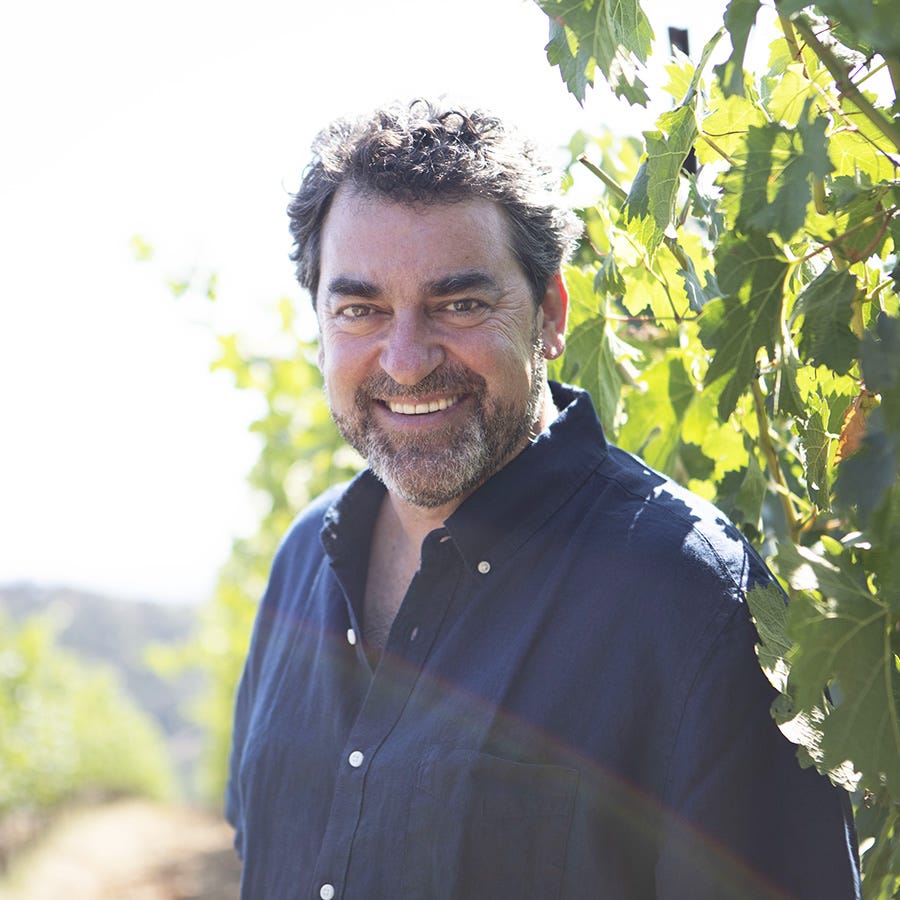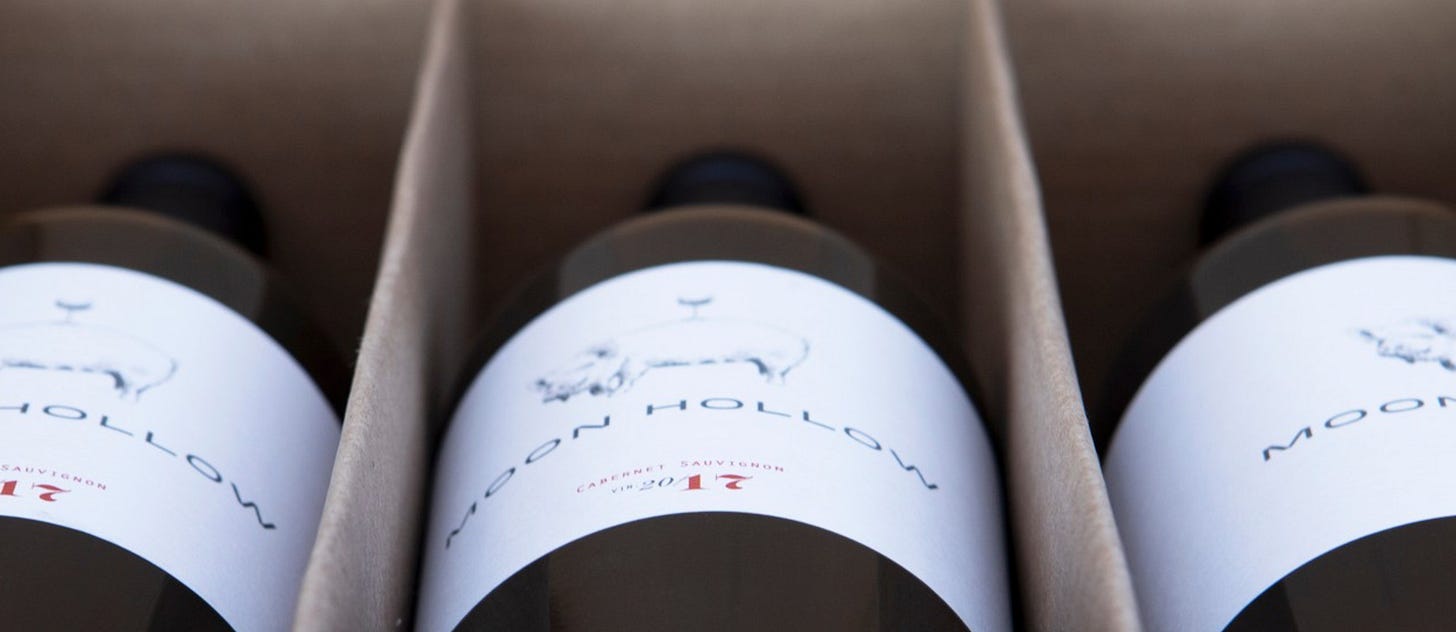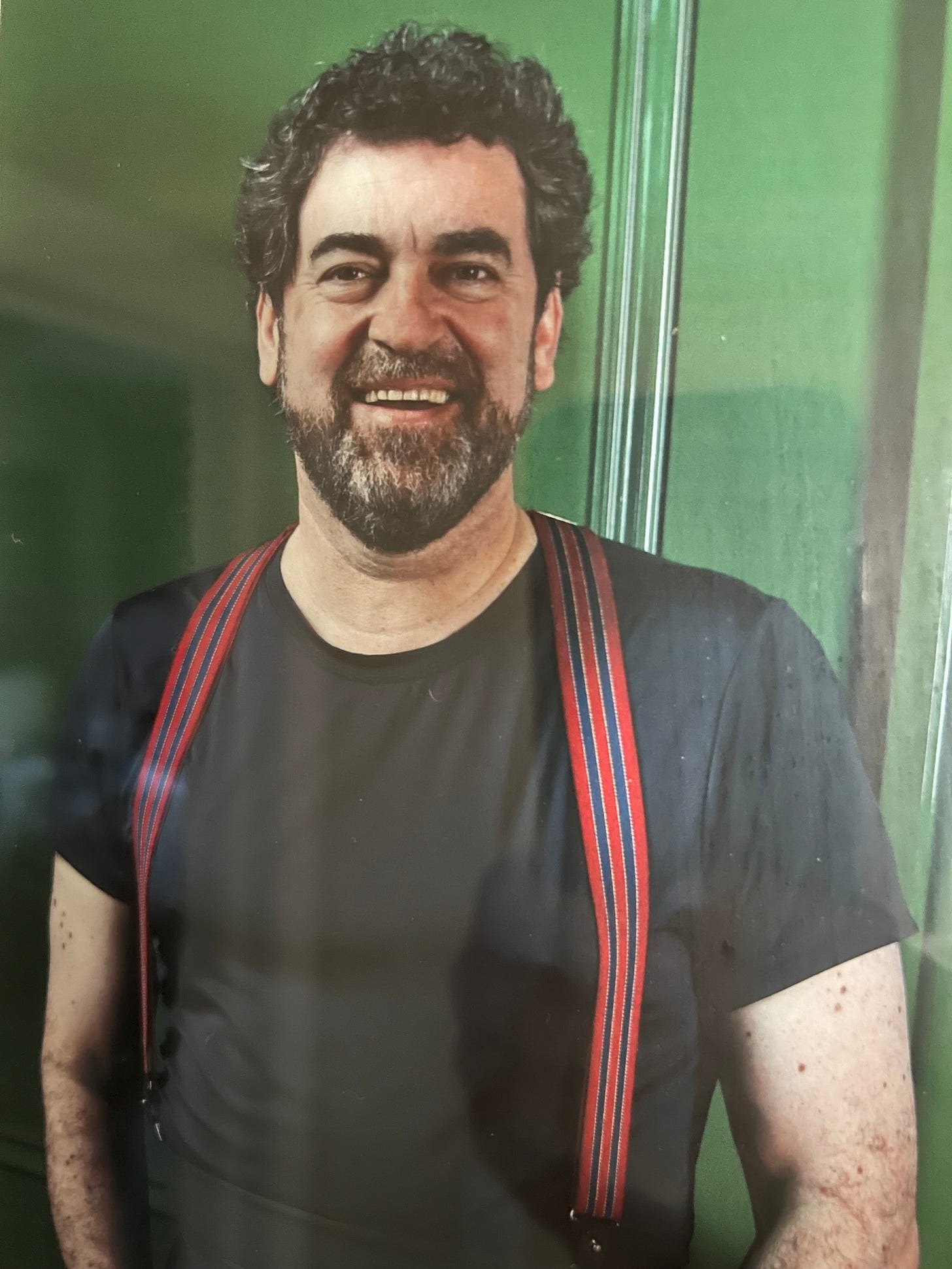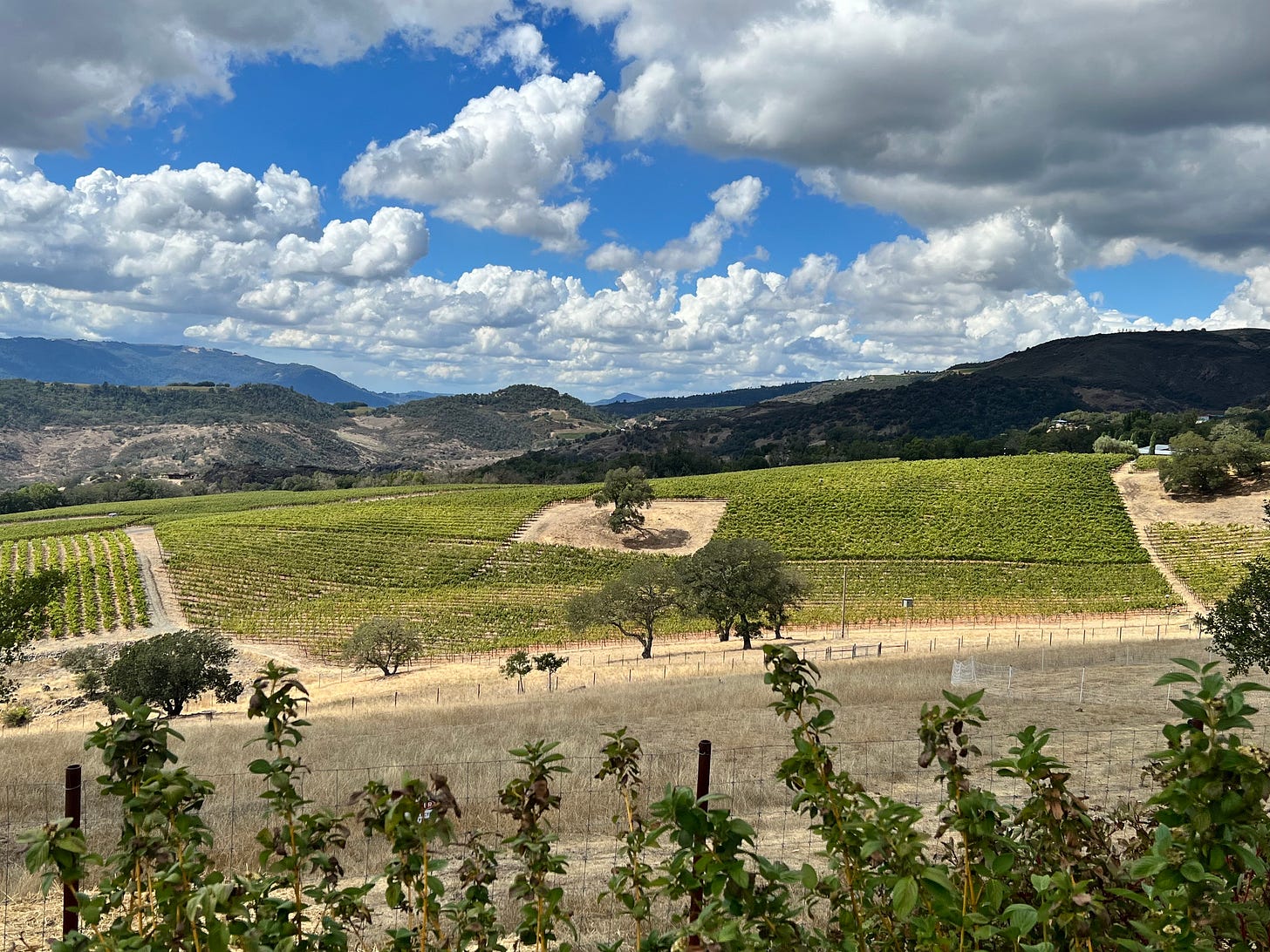Interview Series: Christophe Tassan
The Meilleur Ouvrier de France Sommelier opened up like a great Millésimé.
Born and Raised in Avignon, Christophe’s first job as sommelier was at his family’s local restaurant, l’Auberge de France, steps from the Pope’s Palace. Since then Christophe’s roles within the wine world have included superstar sommelier, wine consultant and educator. He has been chef Alain Ducasse’s go-to wine guy functioning as sommelier and wine director for Mandalay Bay Casino in Las Vegas, and wine director for George Perrier at Philadelphia’s finest French restaurant, Le Bec Fin. Currently, Christophe is the Estate vineyard production manager (and secret talent) at Moon Hollow in Sonoma.
Christophe has a vast network of personal relationships with the best winemakers in the Rhône Valley, grown from his many years living in the region. Christophe completed his sommelier diploma from the Universite du Vin, the Rhône Valley’s professional wine university. He won the title of 2nd Best Young French Sommelier in 1988, Best Sommelier “South of France” in 1992 and became in 2000 Master Sommelier UDSF. In 2004 he was rewarded with the title of Meilleur Ouvrier de France - Sommelier, France’s highest sommelier distinction.
So without further delay, let’s enjoy a savory and experential discussion with Christophe.
Christophe, front and center in his parents’ kitchen.
The Delivery Man (DM): Can you share some stories from your childhood that sparked your interest in winemaking?
Christophe Tassan (CT): Like Obelix “I fell down when I was a child”!…From my father (Italian born) side, the family is Italian. They left their country during World War II and move to France. As migrants, they established themselves building their own home with farming and growing their own goods. (Grand Pa was a mason, and Grand Ma a cook). This includes a small vineyard producing two barrels of wine for the family. The yearly family harvest time and farming have strongly influenced my growing. Plus, there was always wine at the table during family meals, and we were allowed to try it while very young. From my mother side, my Grand Pa and Grand Ma were wine merchants in northern France and moved to the south of France (1928) establishing themselves as hotel and restaurant owners. My dad (cook) married their daughter (1955) and run their restaurant with Michelin star for over 25 years. I have two older brothers (one is a cook and the second one the accountant) and a younger one (engineer at Eurocopter). I did graduate restaurant school (1982) and Universite du Vin (1983) after a college degree on Mathematics and Natural Sciences (BAC D). Then, I decided to work with my mother in the dining room while my older brothers were in the kitchen and office already. The restaurant being in Avignon (Capital of the Rhone Valley wines) I had a lot of fine dining customers asking questions about local wines and they motivated me to know everything about wine. While doing my military duty in 1986, I studied and competed for the first time, becoming the third best young sommelier in Provence at the official competition. Then I studied and competed more until I got the highest sommelier recognition in France…
DM: Who were your biggest influences growing up, and how did they shape your journey into the wine industry?
CT: While having some of the main Rhone Valley producers’ sons and daughters in my high school and college classes (these relationships turned out to be very helpful and educational while studying wine) the dad of a very good friend became one of my most influential mentor. Pierre Berard from Domaine de Terre Ferme in Chateauneuf du Pape and winemaker at Berard Pere et Fils, a Wine Negociant business. He opened is cellar collection for me and educated me on many wines from other regions of France. On the restaurant side, Patrick Pages from Hostellerie Chantoiseau (in Cevennes / Languedoc) one of the very few Master Cook having diplomas in Sommellerie, taught me how to become a better sommelier and guided me through my path to contests, with introducing me to Philippe Faure-Brac who showed us young sommeliers the path to highest level of professionalism.
DM: Was there a particular wine or vineyard that made a significant impact on you during your formative years?
CT: I must mention that I am not a winemaker! But I am a sommelier being today the “regisseur” or, who one could say, the production manager for an estate in Sonoma. I work with the winemaker My experience on wine has been made and started with Gigondas, the Villages of Cairanne, Vinsobres, Saint Maurice and Seguret, as well with Chateauneuf du Pape. The closest vineyards from Avignon where was located the restaurant. The wines from the Rhone Valley and more specifically Cairanne and Gigondas were strongly influentials to me. I did my first full harvest and winemaking apprenticeship with Corinne Couturier at Domaine Rabasse Charavin in Cairanne (1989), and many tastings at Chateau St Cosme in Gigondas with Louis Barruol. Their estates being in the path from Avignon to the family house located in Nyons (capital of black olive and olive oil production. The first AOC for olives and oil in France!). I did produce and bottled the family olive oil for several years before moving to the US in 2005.
DM: How did your early education and experiences guide you toward a career in Estate vineyard production management?
CT: I would say that the” wine” side of the restaurant industry, made me feel close to my Grand Pa sustainable farming philosophy; my Dad uncompromising Michelin star level of cooking, reminded me of the great childhood days for good organic healthy produces. Keeping me in the “natural” motion of winegrowing and farming lifestyle. Keeping in mind that my friends winemakers asked me to travel with them and present their wines worldwide…
DM: What was the first wine you ever tasted, and how did it affect your perception of wine?
CT: My first wine: The wine that I will take with my on a desert island (in fact I won’t take a wine… but will plant a vine … and make my own wine) is my Grand Pa wine! I can’t have it anymore, and I still have its taste in my mouth.
DM: What led you to become involved with Moon Hollow Winery, and how did your vision align with theirs?
CT: I have never looked for a job! I answered many requests I received during my career and made choices accordingly. The first major change was in 2005 when I decided to take a job in Philadelphia for George Perrier at Le Bec Fin. After we sold the family business. Then I moved to Las Vegas for an Alain Ducasse restaurant. Then accepted a wine director job for the Birch family (DM note: Michael and Xochi)and their club in SF “The Battery” knowing that I will manage the wine production of their Sonoma vineyard; after replanting it from scratch in 2012. I did participate at that time at the vineyard mapping and future wine production plan.
DM: Can you discuss some of the challenges and triumphs you've encountered in your Estate vineyard production management career?
CT: The challenges were the time it took me to open my eyes and awakening to understand the world of wine. I had my palate formatted with Grenache wines and it took me a while to understand other wines! My first visit to Rheingau and Rheinessen brought me to another level of sommelier. I started the first day thinking: “how do people drink these so light and fruity wines, they don’t even taste like wine” to leaving the country thinking” “How amazing is wine diversity”. Same happened the year after when visiting the Piedmont region in Italy. The wines were so tannic for my Grenache Palate… Then I integrated in my memory another unique of the best wine character in the world. About “Triumph”: I believe you never triumph in the wine world! The more you progress, the humble you are. Maybe I can say that I triumph everyday when I initiate a smile on the face from a person I suggest a wine to. I only have a job and only exist with a bottle of wine and a wine lover to enjoy it; without one or the other I don’t have a job…
DM: How do you ensure that Moon Hollow Winery stands out in the competitive wine market?
CT: Pretty easy answer for this one: A wine is beautiful when he is a unique representation of its place and cannot be duplicated somewhere else. I do believe that a wine is a postcard with a taste! And that the Moon Hollow wines have an amazing sense of place and personality; coming out from one of the most influential factor in the wine industry: The Soil (being in that case a strongly volcanic environment).
DM: What has been your proudest moment at Moon Hollow Winery so far?
CT: When I took the decision to harvest all of the Cabernet Vineyard on Saturday October 7th 2017. The fire started Sunday the 8th… I felt that I had good karma. As well when I decided to bottle the Grenache separately from Syrah (they were meant to be blended together). I strongly believe that they have more to say on their own. The current feedback at the tasting room is super rewarding. There are distinct preferences for one of the other. No neutral position here! Instead of yelling in a glass together, they are now beautifully singing on their own. Lots of pride here, in the sense that we try to find the best expression for all of the characters coming out from this vineyard.
DM: As the only MOF - Sommelier (Best Master Craftsman in France, the highest recognition in the trades industry) in the US for a long time, what advice would you give to those looking to start a career in winemaking or Estate vineyard production management?
CT: The MOF have now (luckily) another representative in the US in the person of (absolutely admired in the US!!) Pascaline Lepeltier. We are proudly trying to carry on the legacy of French professionalism, experience, passion, in the hospitality, food and beverage industry. My humble advice would be: Don’t compromise! Give it all, respect, love, guide, and do the right thing even when nobody is watching.
DM: How do you see the wine industry evolving in the coming years, and how is Moon Hollow Winery preparing for these changes?
CT: Allow me to start with saying that some stuff needs clarification! The best wine in the world is best only if there are wine lovers enjoying it!! No wine consumer, no wine… The wine is the pure product of the human hand and knowledge, for the pure enjoyment of the human being. Each and any bottle of wine has a story in it ( I would almost qualify that story as a little genius freed when you remove the cork, genius who will tell you his story). Moon Hollow has a great story, part of the legacy of Sonoma mountain wine production and human evolution in this area. Wine, wherever it is produced, is showing what the human nature is doing to hearth. Moon Hollow vineyard maintenance is helping preserve a piece of land so nature can shine in an oasis of life.
DM: What are some of the most exciting trends or innovations in winemaking or Estate vineyard management that you're currently exploring?
CT: The ultimate winemaking practice is to do “nothing”!! which is the hardest to do… Wine is only fermented grape juice and has stay, as it is. This is the only path to have a wine showing the pure expression of its place. As soon as you start to manipulate, you are compromising and bending/influencing the result. One of the best winemaker in the world (Aubert De Vilaine at DRC said: I am just a nurse, making sure everything goes well during birth).
DM: How does Moon Hollow Winery adapt to the changing preferences of wine enthusiasts?
CT: Moon Hollow has adapted to the climate change! (planting varietals that are used to heat and draught). Grenache is doing well in the mountain. As of adapting to consumer trend, I honestly don’t think we do anything in that regard (no move on lower alcohol levels for example). Taking the example of Moon Hollow white, the low alcohol level, and high acidity is the result of the harvest when the vineyard is telling us to pick the fruit fort the best final harmony. Same for the Syrah that is harvested before the other reds. We listen to the vines.
DM: In what ways does the unique terroir of Moon Hollow influence the wines you produce?
CT: Around here we all have the same volcanic soil. Though! From a place to another just a hundred yards away there are many different subsoils. This fact was observed, studied and mapped accordingly for the re-planting (depending of the subsoil, we have 6 different rootstocks for the vines). Capitalizing on the best results observed in neighbors vineyards. With the experience of the past, we hope to see further in the future!
DM: How do you decide which new wine varieties or blends to introduce at Moon Hollow Winery?
CT: At the time of Moon Hollow planting decision, the observation of what have been done in the past was influential for the call. Carrying on the Cabernet Sauvignon growing Legacy in this area. After all, it is in Sonoma that the first fine wine was bottled in California. And the neighbor Monte Rosso vineyard had Cabernet Sauvignon early planted in the mountain. We would have loved to plant Cabernet everywhere, but the soil was not suitable. We plant two blocks of white and made the call for Grenache thinking of heat and draught coming more frequently in the future. Considering that it takes at least 10 years to observe the result of your decision!
DM: If you could share a bottle of wine with any historical figure, who would it be and why?
CT: A great wine is a wine that initiate a great conversation. Considering that I would like to know more about human nature, how to create unique artistry and science and deliver for others, I would love to share a bottle with Leonard de Vinci.
DM: What's the most unusual wine and food pairing you've tried or recommended?
CT: I still have a memory of a pairing that shouldn’t have worked and delivered a unique emotion… It was in Bandol, 1989, at Chateau de Pibarnon with a barrel sampler and a simple Flan a la vanille, vanilla caramel custard “Crème Renversée”. I have to share another pairing that was so pure and simple: A Viognier from Condrieu, Coteau de Vernon du Domaine Vernay with a goat milk cheese: Rigotte de Condrieu. Flavors combinations and structures were absolutely mesmerizing.
DM: If Moon Hollow Winery were a mythical creature, what would it be and why?
CT: A Siren, Seducing you, and having you losing your rationality for enjoyment, letting you letting it go.
DM: If you could create a wine inspired by a song, what song would it be, and what would the wine taste like?
CT: I believe that Love is the strongest thing that should mater. Loving each other at least, or unconditional love for a partner, family, life. Great love song: “Unchained Melody” from The Righteous Brothers. (The one version sung by Elvis Presley is to cry…). I’ll make a Grenache wine, super soft and silky with intense and profonde aromatics (fruit, fruit cake, dark tea, exotics spices, and many other intoxicating flavors). Long lasting…
DM: What's your favorite wine-related movie or book, and why does it resonate with you?
CT: Wine and food related movie (best!) is Babette’s Feast. Best book: “The Physiology of Taste”. Another unique book about senses: “The Perfume: The Alchemy of Sense.”
“Among all of the places the spirit can escape, wine is one of the best companion for a spiritual and sensorial journey. Its complexity, diversity, richness and subjective power are unparalleled. A single bottle of wine is a whole book for the one deciding to read it.”
DM: Wow. THANK YOU SO MUCH Christophe. I have the feeling I am just exiting a Masterclass on great wines and food. And it was a lot of fun. Now, I have to try some of your recommendations and I will open one of my Moon Hollow Cabernet Franc which to this day, still baffled my dad who, as an expert in Loire Valley wines, was floored when I told him it was a California wine. He couldn’t place it, knew it was probably not from the main wineries in the Loire Valley but he never thought it was a wine crafted outside of France. And THAT is the greatest endorsement I have seen him giving to a wine (even after his VIP treatment at Mondavi Oakville).
A votre santé!












